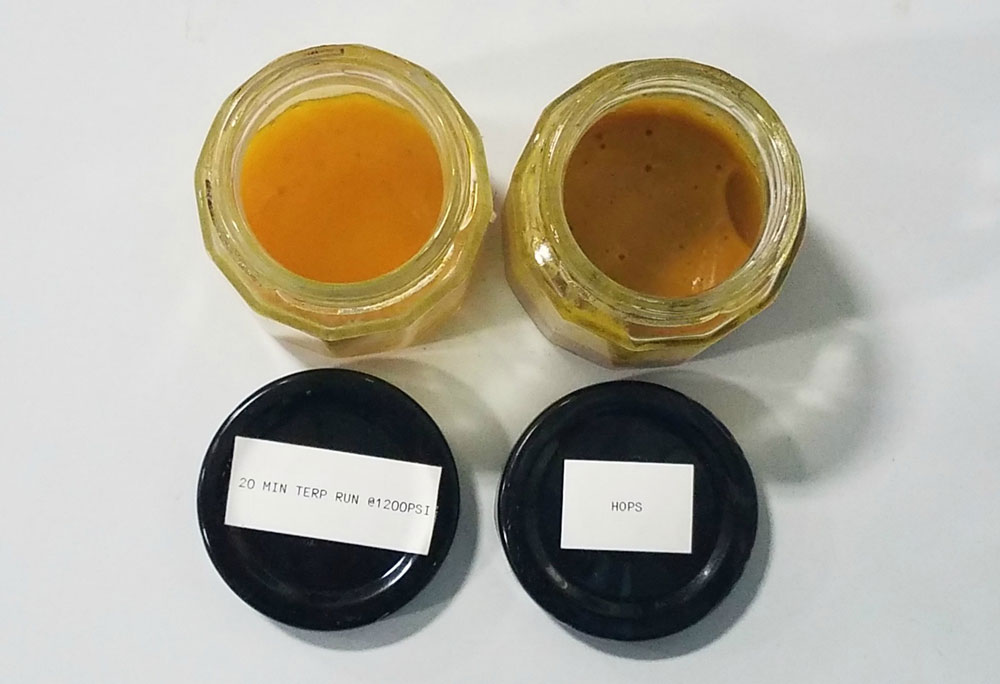Apeks Supercritical CO2 Extraction Systems create award winning vape oil.
Apeks customers frequently use cannabis CO2 oil concentrates made from our extraction systems for vape pens because the high level of terpenes (smell) and flavonoids (taste) are ideally suited for vaping. The extracted oil is so pure and terpene-rich, it can go directly from the collection cup on the machine into vape cartridges. Unlike most other botanical oil extraction equipment which can overheat the plant material, Apeks systems utilize cold separation processing. This means the separator vessel can maintain lower (cold) temperatures necessary for preserving the volatile terpenes and potency, resulting in higher-quality and higher-quantity extractions.
Watch this video to understand cold separation:


Pure, light oil from a terpene run, ideal for vape pens
Being fully automated, Apeks systems allow processors to easily experiment with their extractions simply by changing the extraction parameters (pressure, temperature, time) on the touchscreen. Additionally, any particular extraction can be reproduced on a consistent basis which offers a huge advantage. The data acquisition software on Apeks systems precisely enters data points (temperature/pressure, etc.) so processors can replicate or adjust any extraction run.
Apeks systems are designed and constructed for precision extractions as well as selectivity (the ability to extract different components from the same starting material). The solvency power of CO2 can be adjusted by increasing or decreasing the pressure and temperature to create unique extractions with varying levels of desirable oils and waxes. And less desirable plant constituents like chlorophyll can be deselected. The adaptability of CO2, along with cold separation processing and full automation of Apeks systems, allow our customers to produce some incredible award-winning oil!


Set parameters to replicate or adjust extractions with a touchscreen user-interface


Lighter subcritical extraction on the left, heavier supercritical extraction on the right.
Subcritical and Supercritical Extractions: Tailor to you specific production needs.
Creating CO2 vape oil from an Apeks Supercritical extractor is usually done via a terpene run — a short, 20-minute run at subcritical parameters (low pressure/low temperature). The extract is harvested and either used just as it is, or set aside to be added later to a subsequent extraction. Then the processor can continue a subcritical run to extract more oil. This oil will be slightly darker with fewer terpenes than the initial terpene-run oil but will contain greater amounts of THC. Highly concentrated, it can contain as much as 80% THC. Processors can choose to add some of the terpenes from the first run into this extract to give it the smell and flavor that it lost. Finally, the system can then be set to supercritical parameters (high pressure/high temperature) to extract the rest of the oil. Supercritical extractions also pull waxes and lipids from the plant material which will require a common post-processing technique known as winterization to remove them.
3 basic steps to winterization.
- Mix thoroughly the raw extract with 200-proof ethanol. Then place the mixture into a lab-grade freezer until it reaches -35 to -85 degrees Fahrenheit. The waxes and lipids will separate and harden; the oil and ethanol will remain in liquid form.
- Pour the cold ethanol extract through filter paper inside a Buchner funnel into a vacuum flask. The solid waxes will stick to the filter paper so that only the oil-ethanol mix will filter into the flask.
- Once the waxes are removed, distill the ethanol off of the solution using a rotary evaporator. A rotary evaporator works best to separate the ethanol because it uses a large surface area and low-temperature heating under a vacuum which preserves the flavors in the extracts.
Watch a demonstration of the winterization process:
Apeks offers all of its customers a free 2-hour training class on winterization. (Also available to non-customers for a fee.) Classes are scheduled quarterly at our manufacturing facility in Johnstown, Ohio. Look for dates on Upcoming Events on our website.
Fractional or short path distillation
Processors can further refine oil extractions using a process called short path distillation to extract individual compounds found in the cannabis plant. These compounds have different qualities and uses for helping to treat the symptoms of various medical conditions so it can be beneficial to isolate them to target specific illnesses. Although there are differing opinions on this (see entourage effect described below). Short path distillation is a process where the oil is heated and compounds can be separated because each has a different boiling point.
Read a blog (click here) for more details about short path distillation. For information about extraction of cannabidiol, see how cbd oil is made.
The Entourage Effect
Separating compounds is not as popular as it once was. Now a commonly accepted view in the medical science community and gaining in popularity is that individual cannabinoids are actually less therapeutic than the whole plant. The theory, known as the entourage effect, is that the plant’s multiple cannabinoids and terpenes interacting together are more effective in treating various ailments.
Download a price list today!
COntact Us
Got questions? We have answers.
For more information about our Apeks Supercritical systems please fill out the contact form below and we will respond to you shortly.

